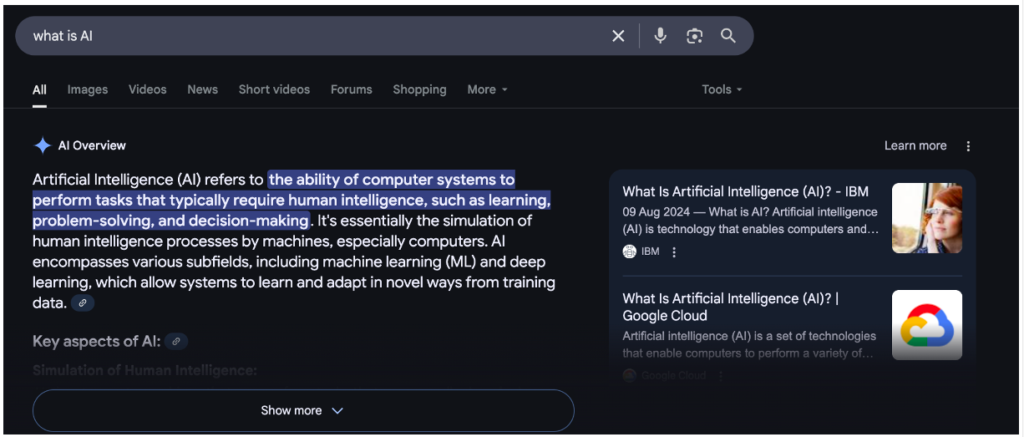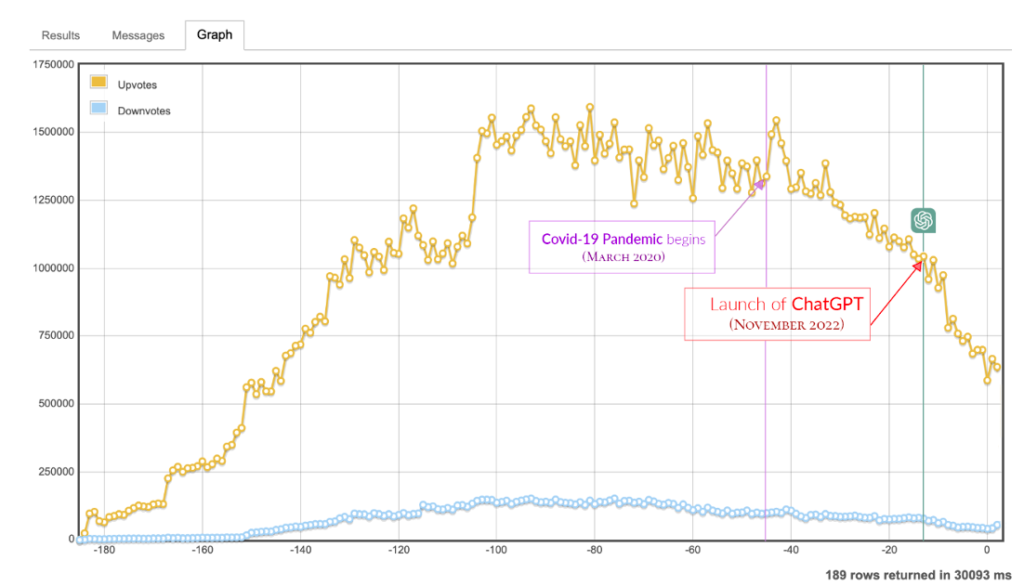Getting Google’s ‘AI Overviews’ to highlight your site comes down to:
- The organic strength of your website
- The way you label your page
- The way you structure your copy
Did you feel that was an abrupt start to an article?
Well, buckle up: it’s a taste of the kind of writing style that may find favour with Google’s AI Overviews.

(Source: Google)
When Google launched the feature in 2023, two things were apparent:
- It was the search giant’s response to the meteoric rise of large language models (LLMs) such as ChatGPT
- It was a shake-up for Google’s ecosystem, comprised of billions of sites that make up the indexed internet, brimming with content that Google organises, ranks and, most importantly, monetises
The first point is understandable. LLMs are popular tools. We now expect answers in the time it takes to say “Hello Google”.
The second point was a shock to the ecosystem. People are searching less and using ChatGPT and similar tools to get their answers. When they do search, they are less likely to click on websites, as Google returns the AI result first.
It’s a serious concern. We can see this play out with sites like StackExchange, an online knowledge-sharing forum for the developer community. Statistics suggest the rise of AI has corresponded with dramatically falling traffic numbers for StackExchange.

(Source: StackExchange)
Understandably, content creators (from whom Google derives its relevance – what would Google organise and rank if it had no free access to high-quality content?) cried foul. CNN even likened the advent of AI Overviews to the striking of midnight on the Doomsday clock.
So the question is: if the goal of online marketing is to drive people to your digital properties, is there now any point in trying to get the highest ranking on Google?
SEO is still relevant
“Absolutely,” says Koketso Mulatedzi, Flow Communication’s digital advertising specialist.
“Despite the emergence of AI-powered platforms, Google Search receives approximately 373 times more searches than ChatGPT. This data underscores that search engines are still the primary avenue for information discovery.
“Brands need to be visible on search to capture customers. For example, ChatGPT can provide information, but it cannot help you buy a specific product at a store in your immediate vicinity, nor can it directly facilitate a booking for a local service.”
Mulatedzi warns, though, that search specialists will have to update their toolkits to keep up with how the landscape has changed.
How to optimise for this new search reality
As long as search engines exist, there will be a need to optimise your content to be visible wherever your target market searches.
Here are some tips:
1. The regular SEO fundamentals still count
The way the search giant ranks content quality has not changed. It still looks at four key factors:
- Experience: Does your content suggest you have authentic, first-hand experience in the field you’re writing about?
- Expertise: Does your content suggest genuine expertise?
- Authoritativeness: Do you have authority to speak on the subject?
- Trustworthiness: How much do others trust you?
The next tips, suggested by SEO experts, could work if your site already ranks highly on Google.
2. Rethink keywords
AI has changed the way that people search, encouraging the use of direct questions. This means that SEO specialists need to understand which increasingly complex questions their target audience might ask in relation to their product.
Third-party tools such as Semrush now offer tools to track your website’s visibility on AI Overviews.
3. Adjust how you structure content
AI Overviews presents answers, pulled directly from sites. It eschews the rich stories that have long characterised what we regard as good content. This does not mean replacing your copy with bland, eye-glazing drivel suitable only for the palate of a bot.
It does mean structuring your content so it offers a question and answer at the top, to sate the bot.
4. The bottom line: don’t panic
Perhaps as a result of two decades of what the tech industry blithely calls “disruption”, there is a tendency to predict catastrophe with every new wave of change. Will AI search ultimately destroy content creation by cutting off traffic to websites?
Some commentators say the fears are overblown. For their part, Google is convinced that AI will increase traffic to sites.
Time will tell.
For now, it seems the best course is for developers and search specialists to get familiar with the new tools, begin experimenting, and stay true to those fundamental principles of working in a digital world: be agile, measure and optimise.
Richard Frank is chief technology officer at Flow, one of South Africa’s leading marketing and communications agencies. Founded in 2005 in a small spare bedroom, the company is now a multi-award-winning agency. For more information, visit www.flowsa.com. You can also follow Flow on Facebook, LinkedIn, X, or on Instagram.














